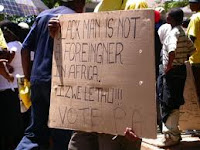I decided to post on the issue of racial mis-treatment of dark-skinned Kenyans at the upmarket coffee joint, ArtCaffe, following a Facebook post by my friend, Happy, which I have reposted here:
Status UpdateBy Happy IamThis tirade against Art Caffe/Tribe Hotel/Stanley Hotel/Hilton Hotel by largely middle-class Nairobians makes me want to jump up and down screaming; however for very different reasons from why the majority are jumping up and down screaming. This tirade is yet another reminder of how largely unexamined race and racism remains in the imagination of most middle-class Nairobians. When the racist individual who refuses to jump to our service as fast as to the service of a white person interrupts the pursuit of our leisurely activities, we mobilise on facebook and twitter demanding boycotts and apologies from these institutions.
Yet, when we sit around our chama meetings drooling over our beautiful lighter skinned friends, or pondering about the way to go to “cha-mbele” or modeling our lives after the fictional white characters we see on tv, no-one is demanding a boycott of any kind. When we find ourselves apologising for our African ways inadvertently (most of the time), we sit comfortably and swallow the next humiliation thrown our way.
We are silent when we dream about "soft straight easy to manage" hair, we are silent when we continue to insist that western education/medicine/teaching/democracy/development is superior to all things African. We are silent when we refuse to speak of our African "dialects" that are dying as we struggle to learn yet another Western language. We are silent when we believe the narrative that our ancestors were "less than" since they didn’t write down our history. And then use that same excuse to justify why we do not know our history. We are silent about the insidious, soul-killing, ugly racism we see so often that we are now blind to it.
Yes, members of staff at Art Caffe/Tribe Hotel/Stanley Hotel/Hilton Hotel/”insert name of just about any entity in the Nairobi hospitality industry here” act in a racist manner. And it sucks. However, could we enrich this conversation about race and racism in Nairobi to deal with how we continue to ignore race and racism in our daily lives as middle-class Nairobians? (And don't get me started on the class issues at play here...)
This post engaged my mind for awhile as I lay pondering the many difficult issues that it raised. I therefore decided to share her interesting perspective by
which I absolutely agree with and also share my thoughts on the same. The post took me back to the psycho-analytic characterization
of the "Man' (in this case the "black wo/man) in Fratz Fanon's Black Skin, White Mask..where he pointedly notes that despite the external desire to be independent and to connect with his/her cultural roots, "the black man wants to be white, the white man slaves to reach a human
level."
I have always found it intriguing how we can be so
angry/indignant about the most visible forms of racism (such as the
Artcaffe issue) but be very comfortable/acquiescent to the overt forms of
racially-defined cultural and social domination such as the ones that Happy ably illustrated. Why is it so easy for us as Africans to still sit by
and not take offense (and often play a facilitative active role) as our cultures,
knowledge systems and ways of being are ridiculed, demonized, declared
inferior and irrational, and, in some cases, eliminated? Where is the
anger?
Why has it become normal for parents to say 'I don't want my kid
to have an accent?' yet all we mean is I want my kid not to have an
African accent but to have an American/English accent? Why have we
allowed such mental enslavement; such an overbearing inferiority complex
to become so internalised/epidermalised? The yoke of colonialism and
its attendant subjugation of the African is so well-displayed in the way
the 'Kenyan elite/middle/upper class" lives or dreams of living..Black consciousness and our dignity has been thrown out of the window and we
believe ourselves to have attained equality with the other races-until
we are reminded of 'our place'-as the ArtCaffe episodes illustrates! Until we confront our own role in the entrenchment of racism and its attendant neo-colonialism in our Kenyan and African societies, then it shall be "Not Yet Uhuru."







